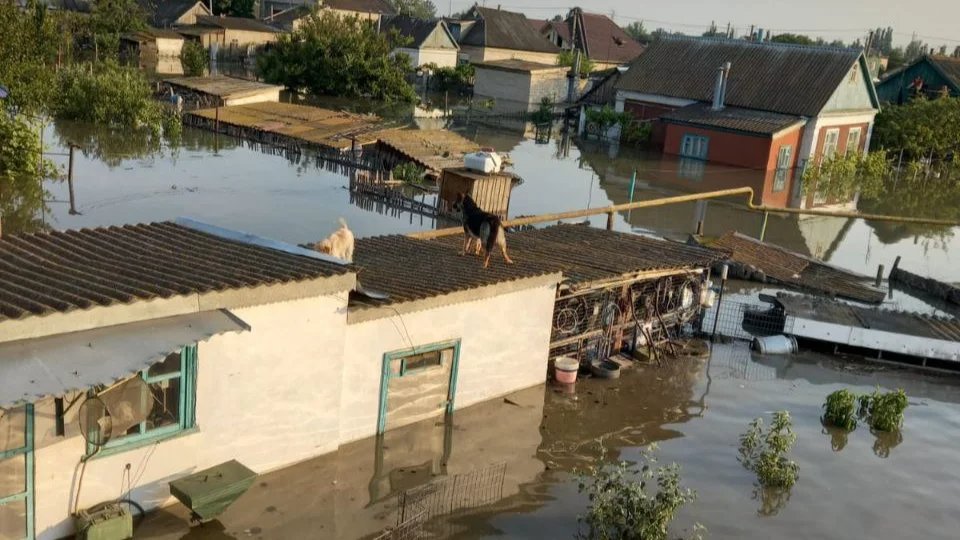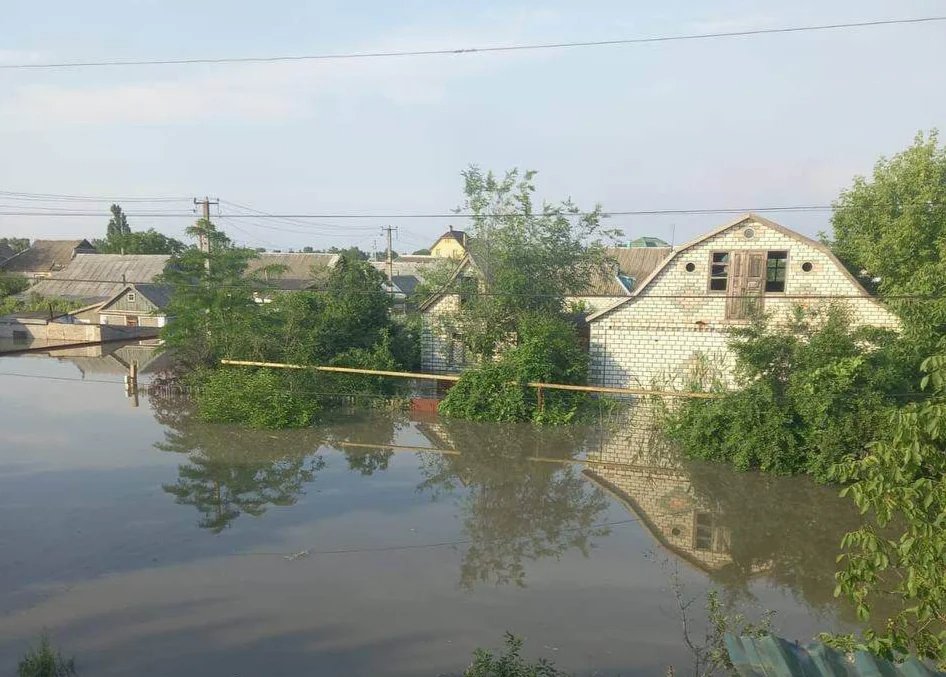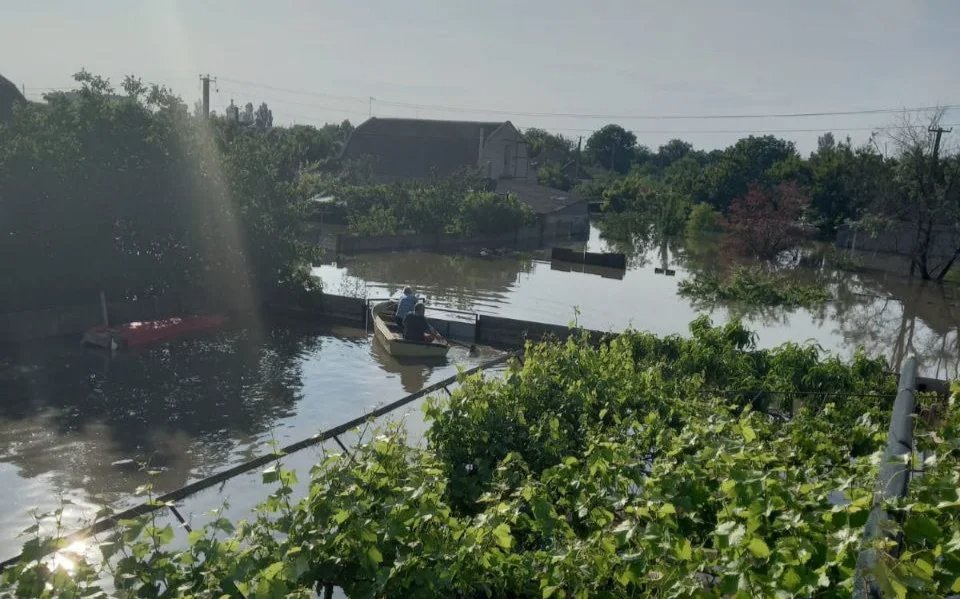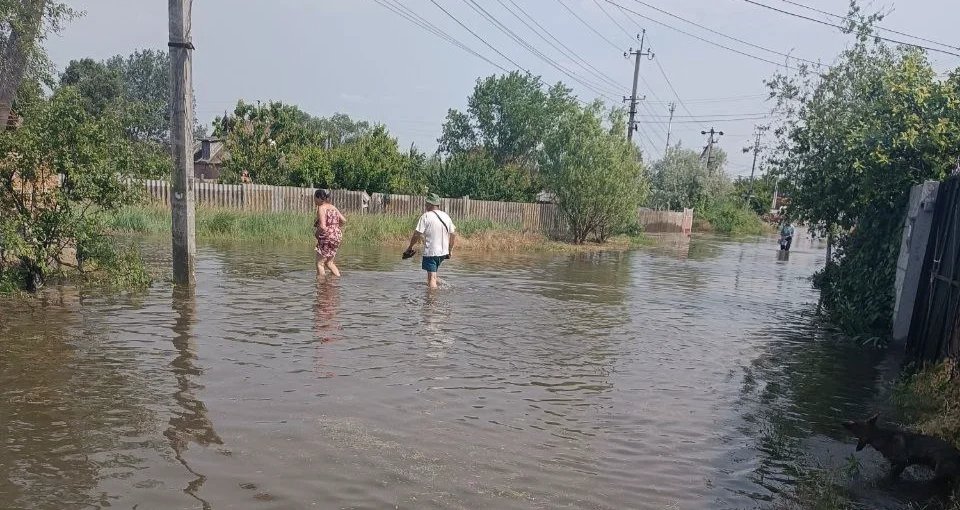Kherson residents now have two “before-and-after” dates. On 24 February 2022 began the war and lengthy occupation of the region, while 6 June 2023 saw one of the worst nightmares of the Ukrainian South — the collapse of the Kakhovka dam. My home city is flooded, as are the neighbouring towns and villages. As I am writing this text, my friends in the occupied towns of Hola Prystan and Oleshky are trapped on roofs in an attempt to save their lives.
Just a few days ago, I kept this diary for an account of life under occupation, but now, I had to add to it the disjointed accounts of the floods. Why disjointed? There is almost no contact with the left bank of the Dnipro River. There is no electricity, so people cannot charge their phones. Those whose phones still had juice could not spare the time for conversation: every minute mattered to grab essentials and move to safety. In the afternoon, many people said “the water would definitely not reach up here”. By nightfall, the local chats were already overflowing with pleas to rescue the people trapped on rooftops. But no one comes to their rescue.
The stories in this diary consist of two parts: before and after the flooding.

Hola Prystan. Photo courtesy of locals
‘I don’t know what to do next. I am helpless’
Yevhen, 45, entrepreneur, Kherson
Recorded on 7 June (after the flooding):
I live in the Zabalka district, it’s close to the river. When the Kakhovka dam was blown up at night, I understood that we would be flooded, but I had no idea of the scale of the disaster: the whole district is now flooded to the rooftops.
Yesterday afternoon, the water started rising. I saw that it began to flood the road and the first houses on our street, which are closer to the river.
When the water started seeping into my house, I still believed it was something that could be fixed. I knocked a hole in the floor right through the screed, installed a submersible pump in there, put a hose through the window and started pumping the water out.
My friends came along and said: you should start getting stuff out, what are you waiting for? I assured them that the water was unlikely to rise any higher. The pump would work for a day and everything would be all right. Besides, the left bank is much lower, so the water should theoretically go there.
But starting at about 4 PM, the water began to rise very quickly: it was a matter of hours before the water reached the roof.
And the level is still rising. My family, of course, has iron nerves. My wife put her feet up and continued watching TV — “oh, there’s a bit of water here”, and my son continued to play on the computer. There was electricity, and the plumbing worked. I kept pumping water through the window, having closed the doors tightly. I picked the mats off the floor and put them on the sofa, and everything else seemed fine.
But then I suddenly saw water pouring inside through the open window. It was a good thing my friends were there, because what I saw stunned me. They scrambled around and started pulling our things outside and loading them into the car, which I had moved out of the yard that morning, just in case. For the first few minutes I stood there, unable to do anything, saying goodbye to my house and my belongings. But my friends brought me to my senses and forced me to load up household appliances and other valuables.
We loaded the car to the brim, and I took my wife and child together with some of our stuff to a friend’s house. Then I came back, and there was so much water outside that the car mats were floating. Again, we loaded up everything we could fit into the car. I drove off. The water started coming in faster, and my friends dragged everything they could into the attic.
On our street, I saw my neighbours’ houses starting to collapse. People shut the doors and windows tightly to keep the water out, and the pressure caused the buildings to collapse like houses of cards. You couldn’t drive up to my house anymore. I left my car and went on foot. All the cars stalled in the water caused a traffic jam, blocking the way out for those who still had their cars running.
When I reached the house, I opened all the windows and doors and let the water inside in the hope of at least preserving the walls and roof. I don’t know how to go on living. The house was old, but I really liked it, it was very livable. The walls are already cracked, and the ceiling has collapsed.
I’m an entrepreneur, I’ve built a factory. I thought nothing was impossible for me. But today, for the first time in my life, I don’t know what to do next. I am helpless.
‘If you say too much today, they will come after you tomorrow’
Olha, 40, entrepreneur, Hola Prystan
Recorded before the flooding:
I am currently unemployed. I have closed my retail outlet because I don’t want any problems. Most of my goods have been sold and I can’t buy new ones. Ukrainian suppliers do not come here, of course, and I don’t want to buy Crimean products.
We are living on savings now. I made a lot of food stocks last summer. In early spring, I panicked and bought so much pasta and grains that we are still eating them. We were afraid that there would be no gas or electricity. An acquaintance of mine was selling chickens, so I made poultry preserves.
I no longer listen to music. I can’t let my guard down for even a little while: I have to always know whether to hide or go about my business.
The other day, I was walking home from my mother’s house and heard a whistling noise: there was a mortar in the air. It was clearly very close and heading towards me. In less than a second, I was face-down next to someone’s stone fence, which covered me from the shrapnel that had hit its other side. I lay there quietly for a couple of minutes, got up, and ran along. It was frightening, of course, but I didn’t think about that — no time for that.
Recently, a young man that I knew were killed along with his child and another relative. They were driving, and shell splinters hit their car. They had just left the petrol station and all perished in the flames.
We have become very restrained in our emotions and communication. If I haven’t seen someone for a long time, I will talk about the weather at best. I don’t know what people are like anymore: the occupation changes people, and I don’t want to take any chances. If you say too much today, they’ll come after you tomorrow. You know, when all this is over, “never left Hola Prystan” will become the benchmark for stress tolerance around here.
The police and the hospitals aren’t working. There is no court or prosecutor’s office. Nobody takes out the rubbish.
It keeps piling up, so the residents of nearby houses all pitch in and ask city crews to take the trash out. We try to keep the city clean as much as we can.
Recently, someone killed a homeless man on one of our streets. He was lying on the road, and nobody picked him up. Those who live nearby went to the checkpoint, told the occupiers to take away the corpse, because no one knows what to do with it. They did, and then they reported that a murder had been solved in Hola Prystan. They say another homeless man killed him. I’m not sure, though. Maybe he did, or maybe they beat the poor guy so badly that he would confess to anything: torture is a regular occurrence for them. Anyway, the fate of the second homeless man is also unknown.
They say you can get used to your tormentor if the violence goes on for a long time, and you can even begin to justify it. I don’t know about other townsfolk, but even today I would kill every occupant. I’ll never get used to it. I haven’t started hating them any less. They came where they were not wanted and they brought so much grief that they do not even realise the extent of what they have done.
Now I hate the Russians. They say they are pursuing some great goal. That’s a lie. Yesterday, they stripped my sister’s house of everything: beds, mattresses, the fridge, everything to the last doormat. One of the invaders, a young Asian-looking guy, found a tool case and happily dragged it to their car — what a “bread-winner”… What great goals are they pursuing? They’re run-of-the-mill criminals: murderers and robbers.
There were occupiers living in my brother’s house. Once they moved out, we returned and found that both toilets were completely filled with crap. Don’t they even know how to flush toilets in Russia? Don’t they hate living in such filth? Not to mention the fact that they stole everything before they moved out, ripped out all the built-in appliances. The upholstered furniture is covered in cigarette burns and alcohol stains. And what they didn’t steal, they broke, smashed up, or shot. They liked shooting at different “targets” in the house.
What’s our attitude towards collaborators? It depends. There are people who had dreamt of the “Russian world” and rushed to get Russian passports and money. That’s forgivable, though. But the snitches that ratted out Ukraine supporters, who were then taken away by the military somewhere with bags over their heads, should be punished to the fullest extent of the law. As for your usual bloke, who’ve worked, say, as an electrician his whole life and continues to do repairs while under the occupation, getting paid by the occupying force now — he’s no collaborator.
Recorded on 6 June, after the flooding:
My husband and I live in an apartment building, everything around us is already flooded, but my few remaining neighbours and I have taken documents, water, and food to the top floor. There is no electricity, the cell network only works occasionally. Of course, people with private housing are in terrible conditions.
No one has tried to evacuate us. They say a car drove down the street announcing the evacuation. But the announcement was made just once, and it wasn’t really convincing. Perhaps that was so that no one would hear it.

Hola Prystan. Photo courtesy of locals
‘If only the occupiers got washed away’
Iryna, 44, unemployed, Hola Prystan
Recorded before the flooding:
We live under daily shelling. The occupiers are shelling us using mortars and a tank. This tank goes all around town, shooting at houses in one place and then in another. We see it all. Or we hear a sound, and in a few seconds, something gets hit by a shell.
Our brave old women asked soldiers in the market why they were shooting at us every day, and they answered: “Why should we spare those who are waiting [for the Ukrainian army]? All the normal people have left for Skadovsk or Russia long ago, but you are waiting for the Ukrainian army and hate us, so there is no one to feel sorry for.” I was standing nearby and heard this conversation. They will definitely not spare us.
When the explosions start, I go to the garden and begin weeding it. I just don’t want to think about anything. I keep myself incessantly busy, so that at the end of the day I am exhausted and manage to fall asleep.
My children have moved on to the next grade in school, and it is a great victory. All comms were often down, so online lessons were rarely available. I had to recall what I had learnt in school. But now they’ve all passed their exams. My husband’s parents insisted that I send them to the new Russian school. And what now? Where is that school, which was opened with such hype on all the Russian channels? It was open for exactly one week, and since then there have been no working kindergartens or schools in town.
The hospital does not work, and there is only one ambulance team on duty. Some doctors stayed in town, but how can one work without equipment? The Russians have taken all the medical equipment out of town.

Hola Prystan. Photo courtesy of locals
Once a month, the “administration” brings pensions and humanitarian aid to the poor. At the market, you can pay either in rubles and hryvnias, whereas the shops only accept rubles. Any salesperson who resisted the ruble could end up in a torture chamber, so no one is taking any risks now. Market sellers are not so keen on rubles, though, because they change their proceeds into dollars.
Apart from sellers and undertakers, only pensioners are leading a relatively good life. They get two pensions: one from Ukraine on their bank card, and the other from Russia in cash.
Recorded on 6 June, after the flooding:
I’ve taken all the things I need up into the attic. My house is nearly at the highest point of town, so there is hope that the water will not reach me and the children. I feel sorry for the people on the riverbank: no one is rescuing them; some have been sitting on the roofs of their houses for hours, and the water keeps coming in. They say the water will only peak tomorrow morning. I hope our men will somehow help those who are having to spend the night on the roof. Hopefully, the “liberators” haven’t stolen all the boats.
No one is trying to evacuate us. The Russian news are announcing it more for show than anything else. The assembly point for those who want to leave town has been put so far away that we couldn’t get there even if we wanted to. I’m not eager to leave my home, though. If the water starts to come in fast, then I will take the children and the car and head towards the sea. I don’t really believe the water will reach our neighbourhood. Besides, the ground is dry, so some of it will seep in.
While we were lugging things around, the town centre suffered some serious hits. Today, fate decided to finish us off with both flooding and shelling.
The trenches that the Russians had been digging for days on end, destroying our beautiful embankment, have been flooded. If only the occupiers got washed away as well — we will readily endure hardship for such joy.

Hola Prystan. Photo courtesy of locals
‘Now all their munitions will be taken into the Black Sea along the Dnipro’
Nadezhda, 70, retiree, Kherson
Recorded on 6 June, after the flooding
I was picked up early in the morning by acquaintances and taken from the Korabelny district by the river to a private house closer to the city centre — the water should not reach there. After having a stroke in autumn, under the occupation of Kherson, I cannot leave the flat on my own, so I’m grateful to the people who do not forget about me. In the Korabelny district, where I live in a ten-storey building, the water can rise up to nine metres, as we were once taught in civil defence class. My flat is on the fifth floor, so the water can’t reach there, but there’s been no electricity or running water since the flooding started. It’s easier to deal with such things in standalone housing.
I called a friend of mine, who is over 80 years old and lives in a village on the left bank of the Dnipro River (the village will go unnamed for security reasons — author’s note). The Russian military lived near him, and they also shelled Kherson and the occupied land from there. When the water began to arrive, the soldiers warned him about it and even told him that they would take him to a safe place. They told him not to go into the garden, because they [the Russian military] had put mines there for some reason. Now all their ammunition will be taken into the Black Sea along the Dnipro. At some point, something will hit them and they’ll explode. Others will drift ashore and kill somebody there. It’s terrible what they have done to my land. Anyway, I talked to my friend for a bit and then we got cut off. I rang and rang, but the phone was out of range. But I’d forgotten to tell him to untie his dog, otherwise our dear Druzhok would die.”
Делайте «Новую» вместе с нами!
В России введена военная цензура. Независимая журналистика под запретом. В этих условиях делать расследования из России и о России становится не просто сложнее, но и опаснее. Но мы продолжаем работу, потому что знаем, что наши читатели остаются свободными людьми. «Новая газета Европа» отчитывается только перед вами и зависит только от вас. Помогите нам оставаться антидотом от диктатуры — поддержите нас деньгами.
By clicking the Support button, you agree to the processing of your personal data.
To cancel a regular donation, please write to [email protected]
